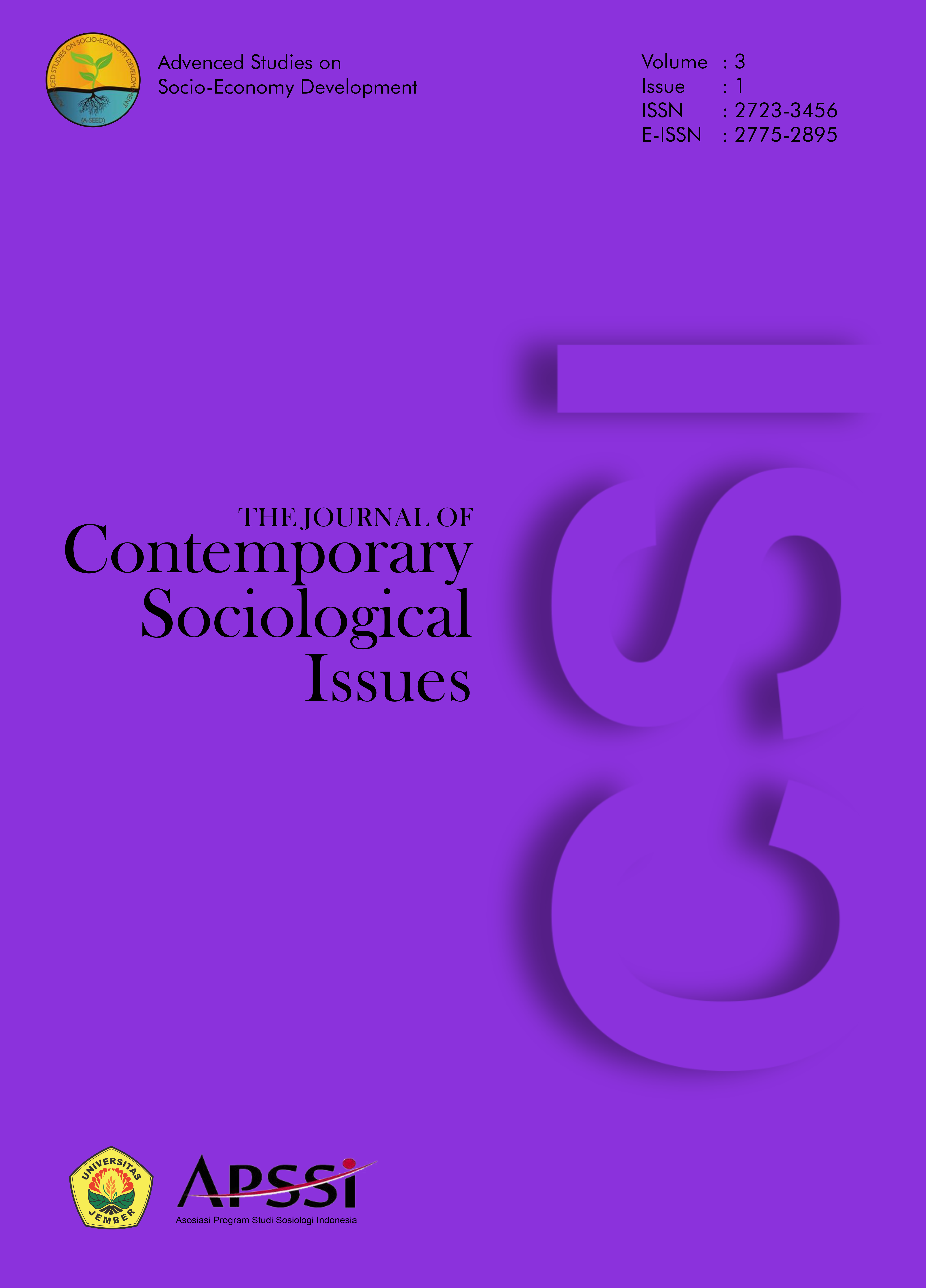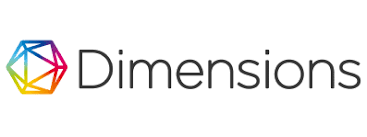Polarization on the Polemic of the Job Creation Law
DOI:
https://doi.org/10.19184/csi.v3i1.30136Keywords:
Corpus-Assisted Discourse Study (CADS), Cyberspace,, Job Creation Law, Omnibus Law, PolarizationAbstract
The Omnibus Law on the Job Creation Law (UU Cipta Kerja) which was authorized in October 2020 amid the COVID-19 outbreak has raised pros and cons among the public, policymakers, investors, and workers in Indonesia. It is considered to be detrimental to the lower middle class while benefiting certain entities. Consequently, there was a polarization of public discourse in cyberspace. Therefore, this study aimed to map polarization trends in the internet community regarding the polemic on the Job Creation Law. This research used mixed methods with the Corpus-Assisted Discourse Study (CADS) framework. The trend amongst the cyber community indicated that there was group polarization in perceiving these issues, where both pro and con groups have different arguments and justifications in addressing the matter. The research data was in the form of tweets corpus totaling 12,224 tokens related to the Job Creation Law. The Natural Language Toolkit (NLTK) package built into Python 3.9.2 was used for tokenization and stopword removal. Lancsbox 6.0 was used to compute keywords and determine concordances. Furthermore, the significance of the keyword frequency was calculated using the Log-Likelihood test. This study identified three main topics in the controversial debate on the Job Creation Law, namely 1) State financial and economic policies; 2) Employment, length of service, and income; and 3) Environment and sustainability.
Keywords: Corpus-Assisted Discourse Study (CADS), Cyberspace, Job Creation Law, Omnibus Law, Polarization.
Downloads
References
Ailenei, Oana, and Frank Moulaert. ‘Social Economy, Third Sector and Solidarity Relations: A Conceptual Synthesis from History to Present’. Urban Studies 42, no. 11 (2005): 2037–53.
Bakar, Lastuti Abu, Tri Handayani, and Citra Sukmadilaga. ‘Problems in Practice of Ṣukūk Issuance as Alternative Financing in Indonesia’. Journal of Shariah Law Research 6, no. 1 (25 May 2021): 53–66.
Baker, Paul, Costas Gabrielatos, Majid KhosraviNik, Michał Krzyżanowski, Tony McEnery, and Ruth Wodak. ‘A Useful Methodological Synergy? Combining Critical Discourse Analysis and Corpus Linguistics to Examine Discourses of Refugees and Asylum Seekers in the UK Press’. Discourse & Society 19, no. 3 (1 May 2008): 273–306.
Baskerville, Richard. ‘Information Security: Adapting to Survive’. Information Systems Security 2, no. 1 (1993): 40–47.
Bruns, Axel, Jean Burgess, Kate Crawford, and Frances Shaw. Crisis Communication on Twitter in the 2011 South East Queensland Floods. Brisbane: ARC Centre of Excellence for Creative Industries and Innovation, 2012.
Castle, Jeremiah J., and Kyla K. Stepp. ‘Partisanship, Religion, and Issue Polarization in the United States: A Reassessment’. Political Behavior 43, no. 3 (September 2021): 1311–35.
Dahl, Robert A. Pluralist Democracy in the United States: Conflict and Consent. New York: Rand McNally, 1967.
Eriyanto. Analisis Wacana: Pengantar Analisis Teks Media. Yogyakarta: LKiS Group, 2001.
Esteban, Joan-MarÃa, and Debraj Ray. ‘On the Measurement of Polarization’. Econometrica 62, no. 4 (1994): 819–51.
Fauzi, Agus Machfud. ‘Resistensi Masyarakat Terhadap Pengesahan UU Cipta Kerja Dalam Perspektif Sosiologi Hukum’. Reformasi Hukum 25, no. 1 (2021): 77–91.
Fiorina, Morris P., and Samuel J. Abrams. ‘Political Polarization in the American Public’. Annual Review of Political Science 11, no. 1 (2008): 563–88.
Habibi, M. N. ‘Analysis of Indonesia Politics Polarization before 2019 President Election Using Sentiment Analysis and Social Network Analysis’. International Journal of Modern Education & Computer Science 1, no. 11 (2019).
Hobolt, Sara B., Thomas J. Leeper, and James Tilley. ‘Divided by the Vote: Affective Polarization in the Wake of the Brexit Referendum’. British Journal of Political Science 51, no. 4 (October 2021): 1476–93.
Layman, Geoffrey C, Thomas M Carsey, John C Green, Richard Herrera, and Rosalyn Cooperman. ‘Party Polarization, Party Commitment, and Conflict Extension among American Party Activists’. American Political Science Review 104, no. 2 (2010): 324–46.
Lim, Gene, Andrea Waling, Anthony Lyons, Christopher A. Pepping, Anna Brooks, and Adam Bourne. ‘The Experiences of Lesbian, Gay and Bisexual People Accessing Mental Health Crisis Support Helplines in Australia’. Psychology & Sexuality 13, no. 5 (5 December 2022): 1150–67.
Novita, Ika, Icha Nur, and Tiara Rose. ‘Konstruksi Realitas Media (Analisis Framing Pemberitaan UU Cipta Kerja Omnibus Law Dalam Media Online Vivanews Dan Tirto.Id )’. Jurnal Syntax Admiration 2, no. 1 (23 January 2021): 69–84.
Nurrochmat, Dodik Ridho, Ristianto Pribadi, Hermanto Siregar, Agus Justianto, and Mi Sun Park. ‘Transformation of Agro-Forest Management Policy under the Dynamic Circumstances of a Two-Decade Regional Autonomy in Indonesia’. Forests 12, no. 4 (April 2021): 419.
Partington, Alan. ‘Corpora and Discourse, a Most Congruous Beast’. Linguistic Insights - Studies in Language and Communication 9, no. C (2004): 11–20.
———. ‘Modern Diachronic Corpus-Assisted Discourse Studies (MD-CADS) on UK Newspapers: An Overview of the Project’. Corpora 5, no. 2 (2010): 83–108.
Rayson, Paul, and Roger Garside. ‘Comparing Corpora Using Frequency Profiling’. In The Workshop on Comparing Corpora, 1–6. Hong Kong, China: Association for Computational Linguistics, 2000.
Rinscheid, Adrian. ‘Crisis, Policy Discourse, and Major Policy Change: Exploring the Role of Subsystem Polarization in Nuclear Energy Policymaking’. European Policy Analysis 1, no. 2 (2015): 34–70.
Scharrer, Erica, and Srividya Ramasubramanian. Quantitative Research Methods in Communication: The Power of Numbers for Social Justice. New York: Routledge, 2021.
Sloan, Luke, Jeffrey Morgan, Pete Burnap, and Matthew Williams. ‘Who Tweets? Deriving the Demographic Characteristics of Age, Occupation and Social Class from Twitter User Meta-Data’. PLOS ONE 10, no. 3 (2 March 2015).
Sutan, Arissy Jorgi, Achmad Nurmandi, Dyah Mutiarin, and Salahudin. ‘Using Social Media as Tools of Social Movement and Social Protest in Omnibus Law of Job Creation Bill Policy-Making Process in Indonesia’. In Advances in Digital Science: ICADS, 261–74. New York City: Springer International Publishing, 2021.
Tajfel, H, and JC Turner. An Integrative Theory of Intergroup Conflict, In The Social Psychology of Intergroup Relations. California: Brooks/Cole, 1979.
Takahashi, Bruno, Edson Tandoc, and Christine Charmichael. ‘Communicating on Twitter during a Disaster: An Analysis of Tweets during Typhoon Haiyan in the Philippines’. Computers in Human Behavior 50 (2015): 392–98.
Tremblay, Crystal. ‘Advancing the Social Economy for Socio-Economic Development: International Perspectives’. The Canadian Social Economy Research Partnerships (CSERP) 1 (2009): 1–54.
Vaillancourt, Yves. ‘Social Economy in the Co-Construction of Public Policy’. Annals of Public and Cooperative Economics 80, no. 2 (2009).
Warburton, Eve. ‘Deepening Polarization and Democratic Decline in Indonesia, In Political Polarization in South and Southeast Asia: Old Division, New Dangers’, 25–40. Washington DC: The Carnegie Endowment for International Peace, 2020.
Wilson, Tom, Fiona Shalley, and Francisco Perales. ‘The Geography of Australia’s Marriage Law Postal Survey Outcome’. Area 52, no. 1 (n.d.): 164–75.
Wirawan. Konflik Dan Manajemen Konflik: Teori, Aplikasi, Dan Penelitian. Jakarta: Salemba Humanika, 2010.
Wodak, Ruth. Critical Discourse Analysis, In Qualitative Research Practice. London: Sage Publications Ltd, 2004.
Ye, Shaozhi, and S. Felix Wu. ‘Measuring Message Propagation and Social Influence on Twitter.Com’. Social Informatics 6430 (2010): 216–31.
Downloads
Published
Issue
Section
License
Copyright (c) 2023 Sulistya Ningrum

This work is licensed under a Creative Commons Attribution-NonCommercial-ShareAlike 4.0 International License.








